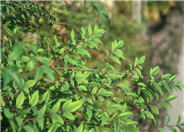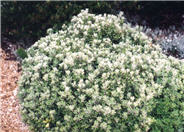
Common name:Nandina, Heavenly Bamboo
Botanical name:Nandina domestica
Nandina domestica is a graceful upright shrub that grows from 3'-6' in height. It gets its name from its bamboo-like growth habit. When thinned from the center it bears a remarkable resemblance to bamboo. It is best used in groups. It can be used in a shaded patio or out in a shrub border with full sun. An interesting feature of Heavenly Bamboo is the bronze color in the new growth when planted in full sun. It also bears clusters of white flowers in the spring.

Common name:Jerusalem Sage
Botanical name:Phlomis fruticosa
This hardy perennial is a useful, old-time garden plant with coarse, woolly gray green, wrinkled leaves and yellow, 1" flowers in ball-shaped whorls. It handles drought and poor soils but needs full sun.

Common name:New Zealand Flax
Botanical name:Phormium tenax
New Zealand Flax is a large, bold plant with stiffly vertical, sword-like, green leaves that arise from its base. It should be grown under full sun for best color. Varieties will offer different growth habits and leaf color.

Common name:Dwarf Karo
Botanical name:Pittosporum crassifolium 'Compactum'
Pittosporum crassifolium 'Nana' is an evergreen shrub. It can reach 2'-3' high and 4'-6' wide, densely foliaged and mounding. Leaves are light olive green with fine hairs. New foliage is yellow green. This shrub can be grown in sun or shade. Small maroon slightly fragrant flowers appear in spring. It prefers well draining soil and afternoon shade in warm inland areas. It can tolerate coastal conditions. It needs occasional watering once it's established and more in hot summer areas.

Common name:Dwarf Bottlebrush Little John
Botanical name:Callistemon X viminalis 'Little John'
The 'Little John' exhibits very dense, compact growth to 3' x 3'. It produces clusters of blood red flowers and grey green foliage. A very regular, almost symmetrical, spiral patten of dense oval leaves is shown along the stems.
Designer: Susan and Pat Price
Photographer: GardenSoft
Physical weed control, including mulching, or hand removal protects the watershed from harmful chemicals.
Attract, or buy beneficial insects such as ladybugs and lacewings to control pest outbreaks in your garden.